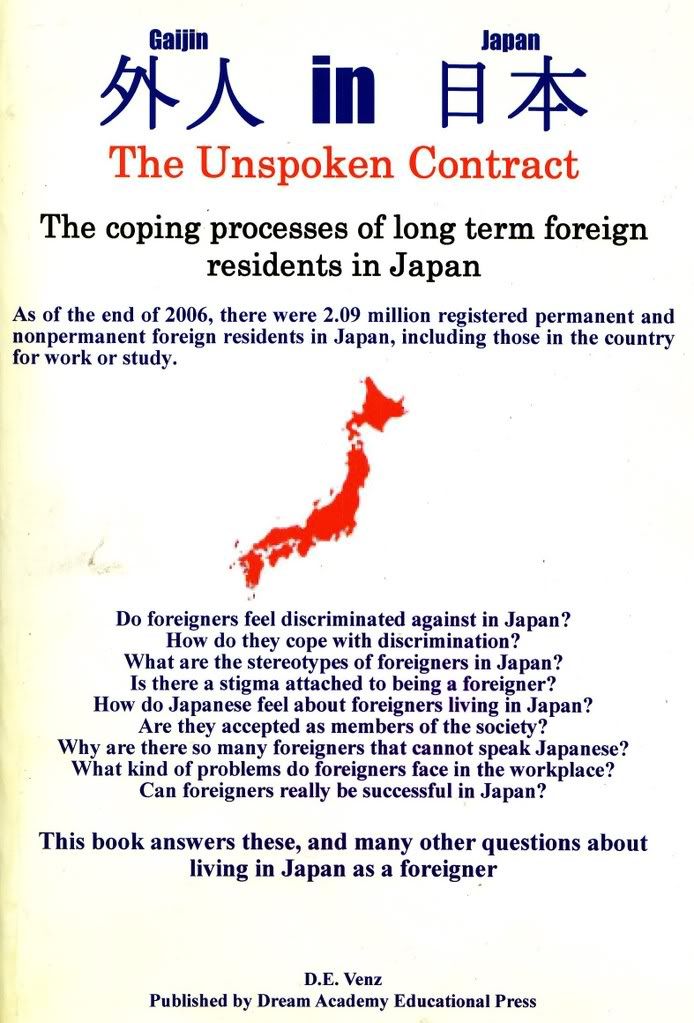Special Thanks to Mr. Dan Edward Venz for allowing this book to be viewed at no cost on the internet.
Checkmate Press
外人 In ・日本 The Unspoken Contract
Copyright (C)2005 Dan Edward Venz. All rights reserved.
![]()
![]()
![]()
Book Information
Title: 外人 In ・日本 The Unspoken Contract
Type: Non-Fiction
Category: Japan/Society

By: Dan Edward Venz
Paperback Edition:
$19.00/\2,000
On-Line Price: \0![]() Chapter 1
Chapter 1
More Books By D.E.Venz
Title: "I"
Type: Fiction
Category: Suspense/Thriller

Read the Preview
Title: Homestay
Type: Fiction
Category: Suspense/Thriller

Read the Preview
Title: Ghost Stories From Japan
Type: Fiction
Category: Horror

Read the Preview
Title: In Memory of Ayumi
Type: Fiction
Category: Love/Romance

Read the Preview
Title: Q & A 200
Type: Textbook
Category: ESL

Read the Preview
Title: Eternal
Type: Fiction
Category: Suspense/Horror

Read the Preview
Title: Image 600
Type: Textbook
Category: ESL

Read the Preview
Title: First Steps in English
Type: ESL Textbook
Category: Children

Read the Preview
Title: Business Skills 2
Type: ESL Textbook
Category: Business English

Read the Preview
About The Author

Dan Edward Venz currently lives in Japan, with his wife and 2 children. He was born in 1966 and raised in San Diego, California. As a child he (Read more about this author)
Enjoy Reading

Quotes from 外人 In ・日本 The Unspoken Contract:
Foreign man:
"It is not that I think Japanese are bad people, it is more that I think they are unworldly and inexperienced in anything that is not 100% Japanese. The Directors at my company are like elementary school children who have been put in charge of the other children while the teacher is out of the classroom. They do not know how to handle the responsibility and if forced, will most likely make a wrong decision. I think if you are not Japanese, Japanese ethics do not pertain to you. I think Japanese are very honest, decent and ethical people, as long as they are dealing with other Japanese people, but not when it comes to foreigners."
Japanese man:
"I think the problem with foreigners is that so many of them choose not to learn the Japanese language that when a foreigner actually does take the time to study the Japanese language he [the foreigner] is regarded in awe by the Japanese around him. This kind of makes the foreigner get big headed...like he is really special because he [the foreigner] speaks Japanese. This is Japan. Shouldn’t he [the foreigner] speak Japanese? When I was in America, no one spoke Japanese to me. I was expected to speak English. It is kind of hypocritical of foreigners to expect us [Japanese] to learn their language when we go to their country, but not want to learn our [the Japanese] language when they come to Japan or think they are special because they have studied Japanese."
Dan Edward Venz:
"My study found that the only "real" benefits for immersed foreigners in Japan were greater abilities to placate the Japanese than non-immersed foreigners. The only "real" difference in status for deeply immersed foreigners seemed to be among the foreign population themselves, and being a powerless minority, this "self-assigned" status by foreigners, to foreigners, was purely a "token status", with no real benefit for the foreigner within Japanese society. This book shows that foreigners in Japan are a powerless minority that the Japanese population tolerates and sometimes enjoys the company of, however, foreigners are often ridiculed, blamed for national problems and almost never taken seriously. In a nutshell, foreigners in Japan cannot be accepted as members of the society."
外人 In ・日本 The Unspoken Contract
"One of the biggest obstacles I, and the foreigners around me faced while living in Japan was the inability to be recognized as part of the Japanese society. Regardless of how much we studied the language and culture, regardless of how hard we tried to conform to the Japanese way of life, regardless of how well we adhered to Japanese etiquette and manners, regardless of how "Japanese" we became, we were always assigned a position "outside" of the Japanese population.
We were, and always would be, "Gaijin in Japan."
Treated as "gaijin", we longed to be treated with the same decency and respect that Japanese demanded for themselves. We longed to be able to live by "one" set of rules, instead of having to live by a "double" set of rules.
I have come to the conclusion that it is not a deeper immersion into the Japanese language and culture which will allow immersed foreigners to become members of the Japanese society, but the education and realization by the Japanese population that we have actually earned the right to be treated the same as members of the Japanese population."Dan Edward Venz"
Foward
"Great spirits have always found violent opposition from mediocre minds. The latter cannot understand it when a man does not thoughtlessly submit to hereditary prejudices but honestly and courageously uses his intelligence." Albert Einstein
This book examines how non-Japanese/foreigners cope under conditions of adversity in Japan. It follows in the tradition of a wide body of qualitative work that has investigated racial minorities and their everyday experiences. Much of the existing work, however, focuses on merely describing thematically and/or conceptually what goes on. The current study aims to construct an integrated conceptual understanding of how non-Japanese engage in the coping process.
More specifically, this book seeks to develop a substantive theory that can explain and predict the behavioral patterns of foreigners in Japan. This study further aims to construct a basic understanding of the Japanese views and behavioral patterns towards foreigners living in Japan (or the stigma of being a foreigner in Japan).
What makes Japan unique to other countries in regards to foreigners is that foreigners in Japan (in contrast to other countries) are not required to immerse themselves into the Japanese language or culture in order to live comfortably, nor do they feel any pressure to become a member of the host [Japanese] population while in Japan (many foreigners involved in this research have lived in Japan longer than 10 years and still cannot read, write or speak Japanese at even a basic level).
This has created a situation, as the number of foreign residents in Japan has increased, in which foreign residents who choose to immerse themselves into the Japanese language and culture are met with substantially more obstacles than foreigners residing in other countries. It has also created an opinion by the host population [Japanese] that foreigners are not willing, or are incapable of learning the Japanese language and culture to an extent which would allow them to become functional members of the Japanese society. Foreigners who have achieved "native-level" abilities in the Japanese language and culture are seen as anolamies and therefore their presence in Japan has not done much to aid in the de-stigmatization of being a foreigner in Japan.
One main reason many of the barriers for foreigners attempting to assimilate in Japan exists is that a large percentage of foreigners residing in Japan, given the alternative of not immersing themselves into the Japanese language and culture, choose not to learn the Japanese language or culture, reinforcing many of the stereotypes that the Japanese population have regarding foreigners and perpetuating the inability of the host population [Japanese] to distinguish between immersed foreigners and non-immersed foreigners. This inability of the host population [Japanese] to distinguish immersed foreigners from non-immersed foreigners leads to stress, anxiety, paranoia, self-alienation and emotional trauma for the immersed foreigner as he/she is presumed by the host population [Japanese] to be non-immersed.
Furthermore, this "non-requirment" of foreigners [by the host population] leads to a tendency for "immersed" foreigners in Japan to engage in assigning a status to other foreigners based on quality of immersion. It further leads to the inability of immersed foreigners to escape the stigma of being a foreigner and at best they [foreigners] are only able to temporarily distance themselves from the stigma, which leads to the coping patterns described later on.
Many of the stereotypes that the Japanese have towards foreigners were created by members of the host population [Japanese] who had experienced living in other countries and brought their opinions back to Japan with them. Some of these Japanese became authors and published books or articles regarding foreigners. Most of these books and articles focused on the differences between Japan and foreign cultures rather than the similarities of Japan and foreign cultures. It was further established that many of the books had a tendency to present a negative perception regarding foreign behavior towards Japan and Japanese. The stereotypes were also reinforced by "immersed" foreigners living in Japan who had access to the media (T.V. and radio).
In many cases, it was found that these "immersed" foreigners saw "non-immersed" foreigners as a threat to their ["immersed foreigners"] status and over the course of the past 20 years these "immersed" foreigners have played a large part in creating the "unspoken contract" (which will be explained) that foreigners in Japan are bound to adhere to in order to ensure host tolerance. The following theories are regarding the attempts of foreigners who have chosen to immerse themselves into the Japanese language, culture and society (and how they cope with the barriers they face in attempting to assimilate, as well as the stigma of being a foreigner in Japan).
To uncover the coping and assimilation process, long-term foreigners, foreign and half-Japanese children, associates, students, personal experiences, data collected from the internet, volunteers and numerous discussions with Japanese were used as the main data source. The discussions with members of the host population [Japanese] took place between 1987 and 2006 and have been used, along with discussions and data from both immersed and non-immersed foreigners, to establish the opinions the host population [Japanese] have towards foreigners as well as to establish the stigma assigned by the host population [Japanese] to foreigners living in Japan.
Other ethnic and minority communities, such as Korean, Chinese and Brazilian communities, which have been substantially more successful in assimilating than other foreigners were also used for comparative purposes. Data was obtained by a number of means; this included interviewing, participant observation, and documentary analysis. The collected data was analyzed over an initial six-year period using constant comparative methods.
To better understand the coping process of foreigners living in Japan a basic understanding of the Japanese views towards foreigners living in Japan is required. It has been documented by a number of academics that the majority of Japanese see themselves primarily as part of a larger group (the Japanese race), more than individuals. Japanese culture and society constantly reinforces the importance of maintaining the harmony of the group over individual opinions and desires by penalizing those who place more importance on personal opinions and desires over the harmony of the group. Japanese, therefore, rarely look or react to situations from a personal viewpoint, but tend to look and react to situations from a "Japanese" viewpoint.
It would be rational to deduce then, that Japanese would tend to look at foreigners as a group (rather than as individuals) as well. This would explain the grouping of many foreign nationalities by the host population [Japanese] into one group, which is the case in Japan. I call this behavior Gaijin Grouping. The most common two groupings of foreigners by Japanese are "gaijin" (Caucasian foreigners) and "kokujin" (Dark-skinned foreigners). It is interesting to note that most Asian foreigners are not put into these "assigned" mass groupings, but rather keep their nationality (i.e. "chugokujin" for Chinese and "kankokujin" for Koreans), therefore the stigma of being a foreigner in Japan is considerably less for "Asian" foreigners than for "non-Asian" foreigners.
It became obvious in my study that both Caucasian and dark-skinned foreigners were assigned to a group based more on physical appearance than by country of origin or nationality. I theorize that this is the main reason for the difference in the successfullness of assimilating when comparing "Asian" foreigners in Japan with "non-Asian" foreigners in Japan. "Asian" foreigners tended to have the distinct advantage over "non-Asian" foreigners due almost solely on their physical appearance (In other words, even though this study regards all foreigners as foreigners, there were certain groups [Caucasian and Dark-skinned] that seemed to have more difficulty assimilating into the Japanese society due to their physical appearance). This has created a condition of "perpetual foreignness" for most Caucasian and dark skinned foreigners.
To the contrary, most "Asian" foreigners were able to mask or hide their foreignness to a certain extent by developing "near" native Japanese language skills. This was not an option for "non-Asian" foreigners in Japan.
This "gaijin grouping" by physical appearance has led to the inability of certain distinctive groups of foreigners to shed the stigma of being a foreigner, regardless of their knowledge of the Japanese language and culture. The aforementioned "stigma" stems from the tendency of the host population [Japanese] to assign foreigners to groups rather than to see foreigners as individuals. Each foreign group comes with pre-conceived stereotypes and behavioral patterns of that group by the Japanese population and any foreigner assigned to that group is regarded and treated by the Japanese population as if those stereotypes pertain to him [the foreigner] regardless of whether or not those stereotypes are characteristics of his [the foreigner's] personality. As a result, these physically distinctive foreign groups are forced to cope with a great deal more stress in Japan than other less physically distinctive foreigners.
It was further discovered that the foreign population also assigned other foreigners to groups, but instead of physical appearance foreigners tended to use quality of immersion (length of time in Japan, Japanese language ability, knowledge of Japanese culture and adherence to the rules of the "unspoken contract") in assigning other foreigners to a group. The "unspoken contract" is explained in more detail before my theories of the assimilation process are presented. Interestingly, it was noted that the longer a foreigner resided in Japan, the more likely he/she was to begin grouping foreigners by physical appearance [like the Japanese] as well as the quality of immersion of the foreigner.
Being assigned a status of perpetual foreigner and having to cope with the stigma of being a foreigner in Japan, regardless of quality of immersion [of the foreigner] has lead to the realization of many foreigners that being accepted as a member of the Japanese society is virtually impossible. This has led to the unwillingness of many long-term foreigners in Japan to immerse themselves into the Japanese language and culture past a depth which enables them to live comfortably. Foreigners living in Japan have [in absence of the opportunity to be accepted as a member of the Japanese society] adopted a rational behavioral process in order to cope with the assigned status as a perpetual foreigner and the stigma of being a foreigner in Japan.
The discovered core process of foreigners living in Japan was one of "enhancing security". There are two types of insecurity that non-Japanese are concerned about: first, insecurity can be seen as "content", which relates to material factors, and second, insecurity can be seen as "emotive", which relates to psychological factors. Ultimately, non-Japanese are seeking to resolve both content and emotive insecurity and they do this by "placating", "challenging" and "affirming". "Placating" refers to various strategies used to pacify the host population and encourage tolerance. Hegemonic structures are acknowledged but not challenged. "Challenging" involves a confrontation with hegemonic structures in an attempt to secure tolerance and hence content and emotive security. "Affirming" is the means by which a foreigner will seek solace from their ethnic identity.
Foreigners engage in the processes of placating, challenging and affirming in many different ways. Some engage in all three processes, others only one or perhaps two. Whatever the case, various factors can be identified that enable prediction of the type of coping process(es) that individuals may employ as they seek to enhance their security.
This book contributes to three areas of research. First, it adds to the small but growing body of work relating to living as a foreigner in Japan. Second, it contributes to research in the area of ethnic relations, especially work that focuses on interaction. And finally, it adds to the formal theoretical literature on stigma and its management.
It is important to note at this point that the following book deals with foreigners and half-Japanese who have immersed themselves in the Japanese language and culture (i.e.; long-term foreign and half-Japanese residents who speak and write the Japanese language at near native level). This study does not refer to short-term foreigners who have not immersed themselves into the language or culture (i.e.; tourists, working holiday, short term English teacher's, entertainers, ex-pats, etc.). Although not discussed in detail in this study, the aforementioned short-term non-Japanese/foreign residents do play a vital role in the difficulties immersed foreigners encumber while attempting to assimilate into the Japanese society due mainly to their very presence in Japan reinforcing many stereotypical idea's and beliefs the Japanese have towards foreigners.
I hope you can gain some knowledge about being a foreigner in Japan by reading this book. If nothing else, if you are a foreigner living in Japan, I hope it makes you stop a moment to contemplate your place in Japan, and if you are Japanese, I hope it makes you wake up to the realization that it is not all roses for foreigners attempting to make Japan their new adopted country. My real ambition in writing this book is the hope that the knowledge gained by those who read it will help make Japan a better country for Japanese and foreigners alike.
![]() Go on to Chapter 1
Go on to Chapter 1